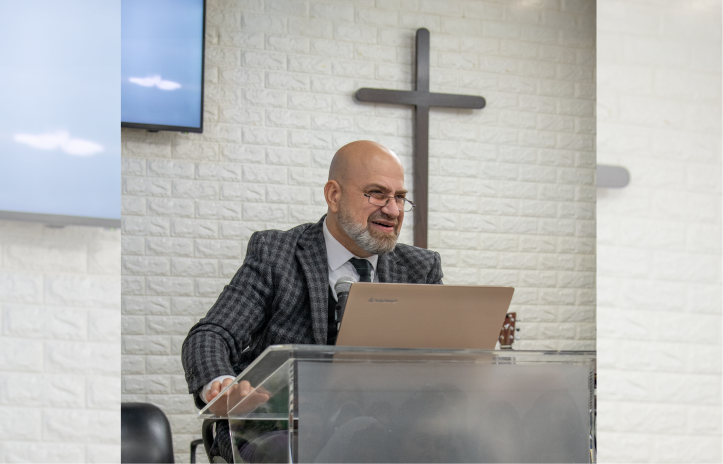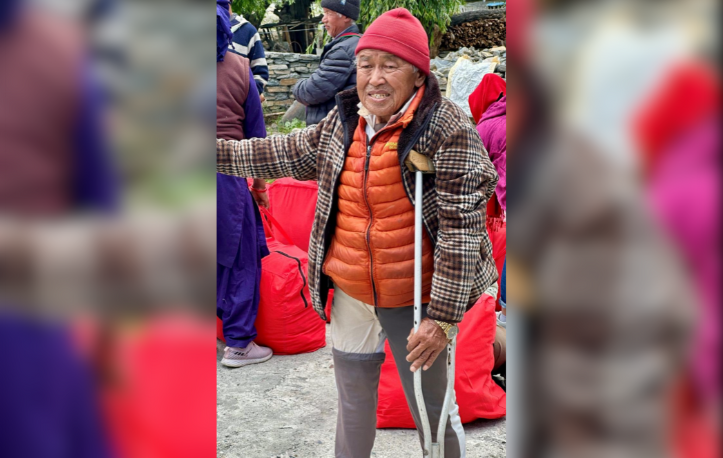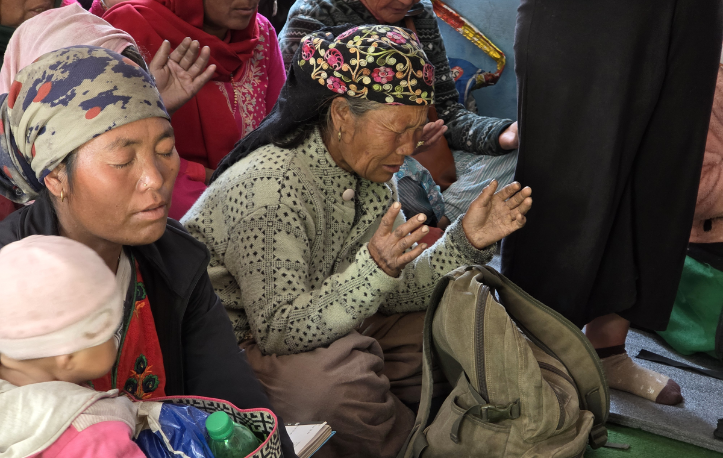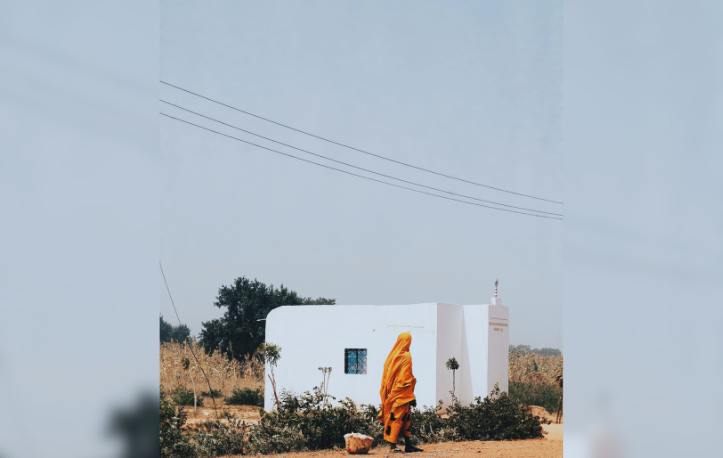Haytham’s marriage proposal to his wife, Mary, was the last and least romantic of the three that she received.
“I think I love you,” he began, “and I want you to be my wife, but I also want to tell you my life’s plan.” Then he explained God’s call on his life — his desire to leave his ministry work in Lebanon and return to his Iraqi homeland to preach the gospel. “Most likely I will be living a harder life than the average person,” he warned.
Haytham was prepared for rejection. He understood that living as a Christian worker in a war-torn, predominantly Muslim country was not every Christian’s calling. His devotion to that calling, however, was precisely what Mary wanted in a husband.
“Lord, I want You to send somebody who is dedicated to You,” she had prayed, “and that is the one whom I want to marry.” She recognised Haytham as the answer to that prayer. A year after getting married, in 1999, the couple moved to an area of Lebanon that was heavily populated by Iraqi refugees and established a ministry in the community.
By the time Haytham and Mary had committed themselves to proclaiming the gospel to Iraqis, Iraq had been in a state of war and economic instability for two decades. So the young couple waited for a sign from the Lord for the right time to go.
The Utmost Need
Haytham had grown up in a Catholic family near Baghdad, but he had many questions about the Bible and about God. What he learned about Islam also left him dissatisfied. Then, in 1994, at age 23, he met some Christians who welcomed his questions. When one of them began to tell him about Christ and the story of salvation, Haytham interrupted him.
“Please forgive me,” he said, “but I know this story. You don’t have to tell me. I need to know if this Bible is really the Word of God or not. If this is the Word of God, I need to know what God wants me to do with it.” Unfazed, the Christian gave Haytham what he asked for confident answers about the truth and power of God’s Word. But then he challenged Haytham not to think about “what God wants from me” but “what I need from God”. This was a perspective Haytham had not considered.
“What do you think is my utmost need?” Haytham asked the young man.
“Your most important need is the most important need of every human being,” the Christian replied. “You are a sinner, and you need Him to save you from your sins.” With that, he returned to the story of the gospel, but this time Haytham understood and responded to the story in a way he never had before.
Haytham’s growth in the faith was rapid. Within a year, he was asked to lead a youth group, and in 1996 he was nominated to attend a theological training programme in Jordan. After completing his training programme, he received an opportunity to go to Lebanon, where he continued his studies while helping a Lebanese pastor plant a church.
But his heart told him that pastoring a church in Lebanon was not the right path for him at the time. During a missions conference, he prayed for the Lord’s direction. “The Lord touched my heart that I have to think about my country of origin, Iraq,” Haytham recalled, “and [that] I have to go preach Christ there.”
Paving the Way to Mosul
Soon after Haytham and Mary began working with Iraqi refugees, two events made it possible for them to begin their work in Iraq.
“In 2003, I finished my theological studies here in Lebanon,” Haytham said, “and the same year the regime of Saddam Hussein fell. I considered that a sign from the Lord that I could now enter Iraq.”
Haytham and another church planter spent a month in Iraq, evaluating the situation and finding a place to work. Baghdad, Haytham said, was “claustrophobic”, with many Christian workers flooding in to take advantage of the region’s sudden openness. So instead of staying there, he and Mary went to Mosul, a city that was harder to reach both geographically and spiritually.
Haytham found a two-story rental house that would enable them to live on the second floor while using the first floor for ministry work. Before the end of 2003, the couple had moved their family of four into their new home.
Mary was immediately confronted with the challenges Haytham had warned her about when he proposed to her. They were shunned by their neighbours, spied on in their homes and denounced in the local mosque.
“Of course, it was hard on me,” Mary recalled. “But because I had the service of the Lord as a goal, this was a great encouragement to me.”
Their work was bearing fruit. “It was a wonderful, wonderful time for the ministry,” Haytham said. “People were so hungry. Within the first two months, the ground floor was packed with people, and I had ministries in every village.” The first group of new believers was baptised soon after the establishment of the church.
Pressure from the community, however, was real and growing. With the mosque only 100 metres from their front door, Haytham and Mary could hear mosque leaders instructing local Muslims to shun them. Haytham also knew he was being followed, and soon their landlord delivered some bad news. The mosque’s sheikh had issued a fatwa against them; the ruling, based on Islamic law, demanded that the Christians be expelled from the community. Their family and their thriving church would have to move.
“Just Move”
Haytham found a new location in Mosul and began working to renovate the building. But violence was on the rise in the city and across Iraq. In the preceding months, church bombings, drive-by shootings, and kidnappings had put the community on edge.
As the Islamic holy month of Ramadan was coming to a close in November 2004, Haytham and his church members were ready to start using their new building. The night before the opening service, Haytham sat down with Mary to have a serious discussion.
“If I were to be martyred, how would you face this reality?” he asked his wife. She didn’t want to consider the prospect, but Haytham pressed the question, reminding her that martyrdom is the price some followers of Christ pay for their faithfulness. He encouraged her to be heroic in the face of such a challenge, should it occur.
The next day, Haytham and his mother were driving to a nearby town to pick up some church members when, in his rearview mirror, Haytham saw a car speeding up behind them. He hugged the edge of the road to let the car pass.
Suddenly, even before he heard the gunshots, he felt the air leave his lungs. Then everything went white as the car stalled and rolled to a stop beside the road.
“I felt I was dying,” Haytham said. He saw scenes from his life and heard Mary and the children talking. “Lord, please accept my spirit,” he prayed, “and please take care of my family.”
Then he sensed a voice inside him saying, “Just move. I don’t want you to die. I want to use you.” Haytham opened his eyes and tried to move, but his body wouldn’t respond.
“Mum, what happened?” he asked his injured mother.
“They shot you,” she said. Haytham had been hit several times. The most serious damage came from a bullet that passed through his body from shoulder to shoulder, partially severing his spinal cord and leaving him paralysed.
The first doctor who treated Haytham asked him questions to keep him conscious. When he heard Haytham praying, he asked if he was calling down curses on the men who had shot him. Haytham’s answer surprised the doctor.
“I wish I could meet them and tell them about the salvation of the Lord,” he told the doctor, “so that they would not die in their sins and go to hell.”
The doctor paused from his work. “I don’t understand you,” he said. “Don’t you want revenge?” When Haytham said no, the doctor asked for an explanation. “God, who is love, He abides in my heart,” Haytham explained, “and He gave me love for all, even for my enemies.”
Meanwhile, Mary and others at the church had become worried when Haytham and his mother did not return. They listened anxiously to news of other violent attacks in the town, but they heard nothing of Haytham. Finally, Haytham’s father and brother went looking for them and discovered what had happened.
When Mary arrived at the hospital, she was shocked by what she saw. Her husband was lying on the floor unable to move, and the hospital was in chaos. Church members took care of Haytham themselves, feeding him, providing medical care, and standing guard.
Later, word reached some friends that Haytham’s attackers were again going to try to kill him, and it became clear that the local hospital was not a safe place. Some Christians smuggled him to the Syrian border, and from there he was taken back to Lebanon for eight months of medical treatment.
“People from all over the world were donating money to treat me in the hospital,” Haytham said. “The number of pastors and ministers who came to the hospital to visit me is just beyond imagination. We really felt how the brethren in the Lord love each other.”
The Promise of Peace
Haytham’s recovery was long and difficult, but he and Mary saw God use even his suffering to bless others.
“I didn’t collapse emotionally,” Haytham said, “but I had hard moments.” Six months into his recovery, a doctor told him it was likely he would never walk again. “This was the hardest word I heard,” he said. “It was like somebody shooting me in the heart.”
Haytham took his heartache to God. “Lord, you promised, ‘My peace I leave to you’,” he prayed. “I want this peace. As You said to Paul, ‘My grace will be sufficient for you.’ I want this grace.” As he prayed, he became increasingly confident that his experience and perseverance would result not only in his own peace but also in the peace of others with whom he shared it. Throughout his hospital stay, he offered comfort and encouragement to both patients and hospital staff.
Today, Haytham has returned to church ministry in Lebanon, but he still faces many challenges. Until recently, he and his family lived in a third-floor flat. Sometimes when the electricity was down, Haytham would have to wait hours before he could use a lift to reach his home, or he would have to leave his wheelchair and pull himself up three flights of stairs. In addition, he can’t visit people as freely as he would like or stand behind a pulpit to preach as he would like.
“I was such a self-confident person,” he said. “I depended on myself, and the Lord taught me to depend on Him more.” Haytham’s increased dependence on God has led to more opportunities to share the gospel. “One of the things that comforts my heart is the ministry,” he said. “This is my source of comfort; it encourages me. So pray for me. We need prayer that the Lord will strengthen us [and] continue with us.”
Despite the challenges he has faced, Haytham now leads a growing congregation and hopes to continue in the calling he received many years ago.




Submit a Prayer